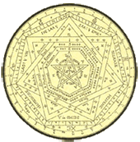The Occult
 The occult is typically referred to as the "knowledge of the hidden," and with regard to medical
aspects, it is known as a process that helps uncover unexplained anemia. To be an occultist means that
the individual has an obsession with uncovering the truth that lurks behind the surface, typically by
use of magic. The magick that is typically included with the occult includes alchemy, extra-sensory
perception, astrology, spiritualism, and numerology.
The occult is typically referred to as the "knowledge of the hidden," and with regard to medical
aspects, it is known as a process that helps uncover unexplained anemia. To be an occultist means that
the individual has an obsession with uncovering the truth that lurks behind the surface, typically by
use of magic. The magick that is typically included with the occult includes alchemy, extra-sensory
perception, astrology, spiritualism, and numerology.
Nowadays, it seems that the word "occult" is overused because anything that does not fall into the bracket of the organized religion falls into the broad term, "the occult." From the fifteenth to the seventeenth century, alchemy was somewhat prevalent, as it became pretty popular with scientists such as Isaac Newton and Gottfried Leibniz. The major problem with the occult with regard to science is that there were complaints that Isaac Newton used it to explain his definition of gravity. During the Age of Enlightenment, the occult was put on hold because of the empirical sciences gaining a foothold. The idea of the occult is that it should take the place of science; it should in some way explain the mysteries of science and restore man's place in the world and enter him or her into a place of dignity. Oddly enough, the Kabbalah is considered part of the occult, as it seems to have elements similar to it.
The occult is not something that arrives out of any physical nature, but rather it comes about through the spirit and the mind. The occult is often useful, as it serves to cure mental, psychological, and spiritual issues. Belief is a powerful tool, and so the success of the occult and its positive effects is directly related to that ability. It appears that currently some scientists actually include at least certain ideologies taken from the occult to be used in their studies.
Many religious denominations see the occult as something evil, a rather malevolent energy that is easily misguided by those that practice it. Only in Judaism is the occult accepted under certain circumstances. Some rabbis choose esoteric or occult principles as part of their ideology; esotericism is quite similar to the occult, in fact the terms are often interchanged in Judaism. Magnetism is also quite similar to the occult, as it also tries to uncover mystical qualities and shed light on them. There is an entire list of terms that share the same principles of the occult.

